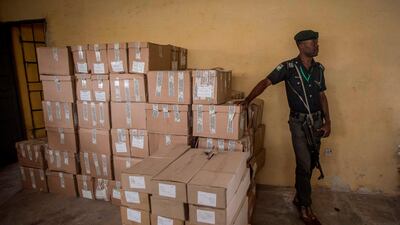Africa's biggest election has been thrown into chaos after officials in Nigeria postponed the contest barely four hours before polls were due to open.
In a press conference convened at 2.45am on Saturday, the Independent National Electoral Commission said it would have to delay the presidential and parliamentary election because of "logistical" difficulties.
Voting had been due to start at 7am, with 84 million people registered to cast their ballots. Many had travelled hundreds of kilometres to do so. The decision is likely to increase the risk of violence between the two main political parties, with some already claiming that it was done to tip the vote in favour of the incumbent, President Muhammadu Buhari.
The electoral commission declined to specify what the exact difficulties had been, or why it had waited until the last minute to announce the delay. In the run-up to the vote, several of the commission's offices have suffered arson attacks, but those were not thought to have amounted to serious setbacks.
Later on Saturday, the commission insisted the delay was "nothing to with political influence" and blamed it on problems transporting electoral materials. Mr Buhari appealed for calm, urging Nigerians to "refrain from civil disorder".
The delay is also a huge blow to Nigeria's hopes of shaking off its reputation as a country where incompetence in government is the norm.
"No one would tolerate such ineptitude in their own personal affairs," said Omoyele Sowore, a news website proprietor who is running as an independent presidential candidate. "Businesses and commercial activities have been disrupted, and the sacrifices of tens of millions of Nigerians who had readied themselves to go to the polls and effect a positive change in the trajectory of the nation has been dashed."
Postponements are not uncommon in Nigerian elections. In the last presidential race in 2015, officials announced a six-week delay just one week before the polls, citing threats from the Boko Haram insurgency in the Muslim north. However, a delay of just hours is unheard of.
Mr Buhari's main challenger in the election is Atiku Abubakar, a wealthy businessman and former vice president who has made four previous unsuccessful bids to win the top job. The polls marginally favour Mr Buhari, but the contest is close and may end up being decided by turnout levels.
While the delay hardly reflects well on the competence of Mr Buhari's administration, some believe it could swing the vote in his favour. His opponent needs a high turnout to win in some areas, and many voters may be unwilling or unable to visit the polls twice.
Mr Sowore said the failure of Mr Buhari's ruling All Progressives Congress (APC) party to criticise the delay suggested that it had orchestrated it. "If this administration had no hand in this callous postponement, their condemnation would have been swift and their denunciation screamed from every mountain top," he said.
The claims of foul play may now heighten the risk of bloodshed after the election, especially if the vote is close. In 2011, some 800 people were killed in clashes during the three days after the polls.
Mr Abubakar accused Mr Buhari of "instigating the postponement" but called on his supporters to remain calm. “We have tolerated the maladministration of this government for four years," he said. "We can extend our tolerance a few more days and give them our verdict via our votes.”
The election already has the feel of a lacklustre contest, with both front-runners seen as ageing relics who should have stepped aside long ago.

Mr Buhari, 76, came to power on a pledge to crush the decade-long Boko Haram insurgency, which has now claimed nearly 30,000 lives. He has failed to make any real gains against the group. In 2017, he also spent five months receiving undisclosed private medical treatment abroad, prompting speculation that he had cancer.
Mr Abubakar, 72, a professed admirer of Thatcherite free-market economics, has pledged to use his business nous to liberalise Nigeria's oil-dependent economy, which has tanked in recent years because of the slump in world energy prices. He has, however, been dogged by allegations of corruption and money laundering from earlier in his career, accusations that he denies.
Matthew Page, a former US intelligence official who is now an associate fellow at London's Chatham House think tank, told The National that the "most logical explanation" was that the delay had been done to rig the vote.
"The electoral commission had previously given every signal that they were ready and prepared. This delay adds a significant obstacle to people's ability to vote, which will favour the incumbent, as the challenger requires a really good turnout to do well."
He added: "It is a real setback for Nigerian democracy. I don't think it will increase the risk of violence in the short term, but it will reinforce a pattern of anti-democratic behaviour that will ultimately produce a backlash."

